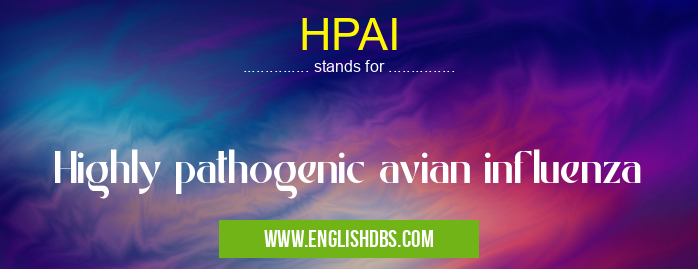What does HPAI mean in SYNDROMES
Biosecurity measures are crucial in preventing HPAI outbreaks:

HPAI meaning in Syndromes in Medical
HPAI mostly used in an acronym Syndromes in Category Medical that means Highly pathogenic avian influenza
Shorthand: HPAI,
Full Form: Highly pathogenic avian influenza
For more information of "Highly pathogenic avian influenza", see the section below.
Key Points
- Causative Agent: HPAI is caused by an influenza virus belonging to the H5 or H7 subtypes.
- Transmission: The virus is primarily transmitted through direct contact between infected and susceptible birds, as well as through contaminated food, water, or equipment.
- Symptoms: Infected birds may exhibit a range of symptoms, including respiratory distress, coughing, sneezing, nasal discharge, and lethargy.
- Economic Impact: HPAI outbreaks can result in high mortality rates in poultry flocks, leading to significant economic losses for farmers.
- Public Health Risk: While HPAI is primarily a disease of birds, it can occasionally spread to humans who come into close contact with infected birds or contaminated poultry products.
Prevention and Control
- Quarantine: Isolating infected birds and flocks is essential to prevent the spread of the disease.
- Vaccination: Vaccination of poultry can help reduce the severity of the disease and its economic impact.
- Surveillance: Regular monitoring of poultry flocks and wild birds is necessary for early detection and response.
- Control: In the event of an outbreak, infected flocks must be culled and disposed of properly to prevent further spread.
Essential Questions and Answers on Highly pathogenic avian influenza in "MEDICAL»SYNDROMES"
What is highly pathogenic avian influenza (HPAI)?
HPAI is a highly contagious and deadly viral infection that affects birds, including poultry and wild birds. It can cause severe illness and death in poultry, and can also pose a risk to human health.
How is HPAI spread?
HPAI is spread through contact with infected birds, their saliva, nasal secretions, or feces. It can also be spread through contaminated objects, such as clothing, equipment, or vehicles.
What are the symptoms of HPAI in poultry?
Symptoms of HPAI in poultry can include sudden death, respiratory distress, swelling of the head and neck, and discoloration of the skin. Infected birds may also experience a drop in egg production and a loss of appetite.
What are the risks of HPAI to humans?
HPAI can pose a risk to human health, although human infections are rare. The virus can be transmitted to humans through contact with infected birds or their secretions, or through consuming contaminated poultry products. Human infections with HPAI can cause a range of symptoms, including fever, cough, sore throat, and muscle aches. In severe cases, HPAI can lead to pneumonia, respiratory failure, and death.
How can HPAI be prevented?
There are several steps that can be taken to prevent HPAI, including:
- Practicing good biosecurity on poultry farms
- Vaccinating poultry
- Isolating infected birds
- Disinfecting contaminated areas
- Avoiding contact with wild birds
What should I do if I suspect my poultry is infected with HPAI?
If you suspect your poultry is infected with HPAI, you should contact your local veterinary authority immediately. They will be able to provide you with guidance on how to handle the situation and prevent the spread of the virus.
Final Words: HPAI is a major threat to the poultry industry and can pose a public health risk. Implementing effective biosecurity measures, surveillance, and control protocols is crucial for preventing and controlling HPAI outbreaks.
HPAI also stands for: |
|
| All stands for HPAI |
